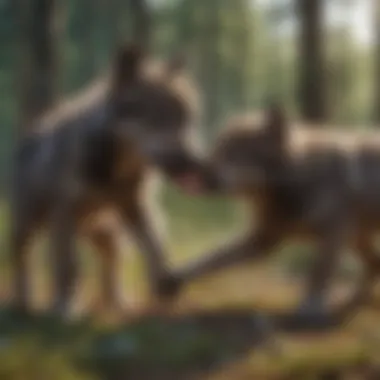Unveiling the Fascination of Embracing a Wolf Puppy as a Pet Companion


Games News
Having a pet wolf puppy is a fascinating prospect that requires careful consideration and understanding of the complexities involved. From the legalities surrounding wolf-dog hybrids to the unique challenges and joys of welcoming such a unique companion into your home, the decision to have a pet wolf puppy is not one to be taken lightly. This article aims to delve deep into the intricacies of this unconventional pet choice, offering insights and guidance for individuals captivated by the idea of having a wolf puppy as a companion.
Reviews
Unique Features
Game Spotlights: Shedding light on the lesser-known aspects of raising a pet wolf puppy, including the training methods, socialization techniques, and dietary requirements specific to wolf-dog hybrids. Developer Insights: Featuring interviews with experts in wolf behavior and training to provide in-depth perspectives on the challenges and rewards of having a wolf puppy as a pet. Event Coverage: Reporting on educational events and workshops focused on wolf-dog hybrids to offer readers opportunities for further learning and engagement with this unique pet choice.
Introduction
Welcome to the intriguing topic of potentially owning a pet wolf puppy. This article aims to delve deep into the complexities, challenges, and joys of considering a wolf puppy as a companion. Delving into the historical context, the biological charms, and the emotional appeal of having a wolf puppy will shed light on the various dimensions of this unique pet choice, allowing readers to make informed decisions.
Understanding the Fascination
Historical Context
Exploring the historical backdrop of wolf-dog hybrids provides valuable insights into their evolution as companions. The intertwining of wolves and humans throughout history showcases a deep-rooted connection that continues to intrigue enthusiasts. The key characteristic of this historical context lies in the bond formed between early human societies and wolf-like creatures. Despite its complexity, the historical context offers a nuanced perspective on the interaction between humans and wild canines, making it a compelling choice for exploration in this article.
Biological Charms
Unveiling the biological charms of wolf puppies reveals their unique physiological and behavioral traits. From their keen senses to their social structures, wolf puppies embody a fascinating blend of wild instincts and potential domestication. The key characteristic of their biology lies in the primal instincts that differentiate them from conventional domestic dogs. Despite the challenges they pose, the biological charms of wolf puppies offer a deeper understanding of canid species and their allure, enhancing the discourse within this article.
Emotional Appeal
The emotional appeal of owning a wolf puppy taps into primal desires for connection and companionship. The mystical aura surrounding wolves has captivated human imagination for centuries, fostering emotional bonds that transcend conventional pet-owner relationships. The key characteristic of the emotional appeal lies in the profound nature of bonding with a creature that straddles the line between wild and domestic. While this emotional connection can be deeply rewarding, it also presents challenges unique to wolf-dog hybrids, adding a layer of complexity to the appeal discussed in this article.
Exploring the Reality
Differences from Domestic Dogs
Examining the differences between wolf puppies and domestic dogs highlights the unique considerations involved in caring for these less conventional pets. From their distinct behavioral patterns to their specialized dietary requirements, wolf puppies deviate significantly from traditional companion animals. The key characteristic of these differences lies in the genetic makeup that influences everything from training methodologies to socialization strategies. Understanding these distinctions is crucial for individuals contemplating the addition of a wolf puppy to their family, making it a relevant choice for exploration here.


Care Requirements
Detailing the specific care requirements of wolf puppies underscores the challenges and responsibilities that come with their ownership. Ensuring a safe and stimulating environment, providing a balanced diet, and addressing their social needs all play integral roles in the well-being of a wolf puppy. The key characteristic of their care requirements lies in the meticulous attention to detail needed to cater to their wilder inclinations while fostering a harmonious domestic life. While rewarding, meeting these care requirements demands dedication and knowledge, forming a significant aspect of the reality of having a wolf puppy discussed in this article.
Legal Boundaries
Laws and Regulations
Navigating the legal landscape surrounding wolf-dog hybrids unveils the intricate framework governing their ownership and welfare. From restrictions on breeding to requirements for enclosures, various laws and regulations aim to protect both the animals and the community. The key characteristic of these laws and regulations lies in balancing the rights of individuals to own exotic pets with the need for public safety and wildlife conservation. Adhering to these legal boundaries is paramount for any prospective wolf puppy owner, making a thorough exploration of these aspects essential in this article.
Ethical Considerations
Delving into the ethical considerations of owning a wolf puppy raises important questions about animal welfare and conservation. Ethical dilemmas surrounding the breeding, rearing, and treatment of wolf-dog hybrids prompt reflection on personal values and societal responsibilities. The key characteristic of these ethical considerations lies in the moral obligations that come with owning a creature that straddles the line between wild and domestic. Balancing the desire for a unique companion with ethical considerations is a critical aspect of the reality faced by individuals interested in welcoming a wolf puppy into their lives, underscoring the depth of discussion within this article.
Preparation and Planning
In this explorative guide on the prospect of having a pet wolf puppy, thorough preparation and strategic planning play a pivotal role in ensuring the well-being and harmonious existence of your exotic companion. Emphasizing the significance of meticulous preparation, one must consider various elements ranging from understanding the wolf's natural instincts and behaviors to creating a secure environment that echoes its wild roots. Planning the integration of a wolf puppy into your life demands foresight, patience, and a deep sense of responsibility. By meticulously preparing and planning, individuals can navigate the complexities of raising a wolf puppy with attentiveness and respect for its unique nature.
Environment Setup
Secure Enclosures
Secure enclosures are integral to the well-being and safety of both the pet wolf and its human companions. These enclosures serve as the wolf's sanctuary, offering a secure space where it can roam and express its natural behaviors without posing a threat to itself or others. The key characteristic of secure enclosures lies in their robust construction, designed to withstand the strength and agility of a wolf. Opting for high-quality fencing materials and secure gating systems ensures that the wolf remains safely contained within its designated area. While the unique feature of secure enclosures lies in their ability to provide freedom within boundaries, it is essential to remember that maintenance and regular inspections are crucial to prevent any potential escapes or injuries. By prioritizing the establishment of secure enclosures, individuals can create a safe haven where their wolf puppy can thrive under careful supervision.
Enrichment Activities
Enrichment activities form a vital component of the wolf's physical and mental stimulation in a domestic setting. These activities mimic the challenges and engagements that wolves experience in the wild, promoting both physical exercise and mental agility. The key characteristic of enrichment activities lies in their ability to prevent boredom and satisfy the wolf's instinctual drives through interactive and stimulating tasks. Incorporating puzzle feeders, scent games, and interactive toys can enrich the wolf's environment, fostering curiosity and promoting healthy behaviors. While the unique feature of enrichment activities lies in their capacity to prevent behavioral issues arising from boredom or under-stimulation, it is essential to rotate activities regularly to maintain the wolf's interest and engagement levels. By integrating a variety of enrichment activities into the wolf's daily routine, individuals can ensure that their pet remains mentally and physically stimulated, contributing to its overall well-being and contentment.
Behavioral Training
Socialization Techniques
Socialization techniques are fundamental in acclimating a wolf puppy to various environments, stimuli, and individuals, shaping its responses and behaviors. The key characteristic of socialization techniques lies in their ability to instill confidence, reduce fear responses, and encourage positive interactions with humans and other animals. By gradually exposing the wolf puppy to different sights, sounds, and experiences in a controlled and positive manner, individuals can help build its social skills and adaptability. While the unique feature of socialization techniques lies in their potential to enhance the wolf's quality of life and facilitate harmonious interactions, it is crucial to prioritize gradual exposure and positive reinforcement to avoid overwhelming the wolf. Consistent socialization efforts coupled with patience and rewards can promote a well-adjusted and sociable wolf companion.


Establishing Hierarchy
Establishing a clear hierarchy within the human-wolf pack dynamics is essential for fostering mutual respect, communication, and trust. The key characteristic of establishing hierarchy lies in defining roles, boundaries, and expectations within the household to prevent confusion and conflicts. By consistently setting and reinforcing rules through positive reinforcement techniques, individuals can establish themselves as leaders while nurturing the wolf's trust and cooperation. While the unique feature of establishing hierarchy lies in its ability to create a structured and harmonious relationship based on respect and guidance, it is crucial to remain consistent in enforcing boundaries and rules. Clear communication, patience, and positive reinforcement are key pillars in establishing a balanced hierarchy that promotes a healthy and respectful bond between the human and the wolf. By prioritizing consistent training and reinforcing leadership roles, individuals can cultivate a secure and trusting rapport with their wolf companion, paving the way for a fulfilling and enriching relationship.
Health and Well-being
As we delve into the intricate world of considering a pet wolf puppy, one of the paramount aspects that demand meticulous attention is the health and well-being of our furry companions. The nexus between the health and well-being of a pet wolf puppy and its overall quality of life cannot be overstated. Understandably, a robust emphasis on maintaining optimal health is crucial to ensure a fulfilling and vibrant existence for our wolf pups, setting the foundation for a harmonious cohabitation.
Nutritional Needs
Balanced Diet
Diving deeper into the realm of nutritional requirements, the concept of a Balanced Diet emerges as a linchpin in fostering the health and vitality of our wolf puppies. A Balanced Diet entails a meticulously curated blend of essential nutrients tailored to meet the specific dietary needs of these majestic creatures. The inherent equilibrium of proteins, fats, vitamins, and minerals in a Balanced Diet not only sustains the physiological functions of a wolf puppy but also fortifies their resilience against potential health hazards. The distinctive feature of a Balanced Diet lies in its ability to optimize the overall well-being of our pets, promoting longevity and vigor indispensable for their well-rounded development.
Supplements
Supplements serve as a supplementary component in augmenting the dietary regimen of pet wolf puppies, enhancing the efficacy of nutrition intake vital for their growth and sustenance. Enriched with specialized nutrients such as omega fatty acids, probiotics, and joint support compounds, supplements play a pivotal role in addressing specific health concerns and deficiencies. The unparalleled advantage of incorporating supplements lies in their targeted approach towards bolstering critical bodily functions and mitigating health risks. While supplements offer a tailored solution to optimize the health and longevity of our wolf puppies, prudent usage and consideration of individual dietary needs are imperative to leverage their benefits effectively.
Medical Considerations
In the realm of safeguarding the health and well-being of our pet wolf puppies, navigating medical considerations emerges as a pivotal aspect demanding earnest attention and diligence. The efficacy of proactive healthcare measures in ensuring the vitality and longevity of our wolf companions cannot be overstated, underscoring the significance of medical considerations amidst the joys and challenges of pet ownership.
Vaccinations
Vaccinations emerge as a cornerstone in fortifying the immune resilience of wolf puppies against potential infectious diseases, equipping them with a shield of protection crucial for their well-being. The fundamental characteristic of vaccinations lies in their role in priming the immune system of our pets, preempting the onset of debilitating illnesses and fostering a robust defense mechanism. The unique feature of vaccinations stems from their preventive nature, offering a preemptive stance against prevalent health risks and advocating for a proactive stance towards safeguarding the health of our beloved wolf companions.
Common Health Issues
Among the myriad considerations encompassing the health landscape of pet wolf puppies, awareness of common health issues assumes paramount importance in proactive care and monitoring. Common health issues such as joint ailments, skin conditions, and dietary intolerances warrant vigilant observation and prompt intervention to mitigate potential health complications effectively. The pivotal role of acknowledging and addressing common health issues lies in averting the escalation of minor ailments into debilitating conditions, emphasizing the significance of proactive health management and informed decision-making in nurturing the well-being of our endearing wolf pups.
Emotional Bonding and Interaction
In this section, we delve deeply into the crucial aspect of emotional bonding and interaction with a pet wolf puppy. Establishing a strong emotional connection with your wolf pup is paramount for fostering a harmonious relationship. Wolves are inherently social animals, thriving on bonds within their pack. Therefore, creating a sense of trust and camaraderie is fundamental.


Building Trust
Building trust forms the bedrock of your bond with your wolf puppy. Effective communication methods play a pivotal role in this process, allowing you to understand your wolf's needs and emotions better. Patience and consistency are key when employing communication techniques. These methods may include body language interpretation, vocal cues recognition, and establishing a routine for clear interactions. Communicating effectively with your wolf puppy builds rapport and mutual understanding.
Communication Methods: Communication methods encompass a range of non-verbal cues and vocalizations that bridge the human-wolf communication gap. By understanding and using these methods, you can convey your emotions, intentions, and expectations to your wolf companion effectively, fostering a stronger connection. One of the significant advantages of utilizing communication methods is the establishment of a non-verbal dialogue that transcends language barriers, laying the foundation for a deep bond.
Bonding Activities: Engaging in bonding activities is another pivotal aspect of building trust and rapport with your wolf puppy. These activities involve shared experiences that solidify your relationship and create lasting memories. From interactive play sessions to joint training exercises, bonding activities provide opportunities for mutual growth and enjoyment. One unique feature of bonding activities is their ability to strengthen the emotional connection between you and your wolf pup, forging a partnership based on trust and companionship.
Handling Challenges
While emotional bonding is rewarding, it is essential to address potential challenges that may arise in your journey with a pet wolf puppy. Understanding how to navigate and overcome these challenges is crucial for maintaining a positive relationship.
Aggression: Dealing with aggression in a wolf puppy requires patience and a deep understanding of their behavior. By identifying triggers and employing positive reinforcement techniques, you can address and modify aggressive tendencies effectively. The key characteristic of managing aggression lies in consistent training, socialization, and creating a safe environment that promotes positive behavior.
Separation Anxiety: Wolf puppies, like domestic dogs, can experience separation anxiety when separated from their owners. Recognizing the signs of separation anxiety and implementing gradual desensitization techniques can help alleviate this issue. The unique feature of addressing separation anxiety lies in building a sense of independence and security in your wolf pup, ensuring their well-being even in your absence.
Community Perspectives
In this section, we delve into the crucial aspect of Community Perspectives within the context of considering a pet wolf puppy. Understanding the wider community's viewpoints and reactions towards owning a wolf puppy can provide invaluable insights into the societal acceptance and challenges related to this unconventional pet choice. Community Perspectives offer a multifaceted lens through which we can evaluate the impact of integrating a wolf puppy into our lives. By assessing public opinions, cultural attitudes, and collective values, individuals can make more informed decisions regarding the adoption and care of these unique animals.
Public Perception
Stigma
Exploring the concept of Stigma in relation to wolf ownership sheds light on the societal biases and stereotypes that surround this practice. Stigma acts as a significant barrier for individuals interested in embracing the companionship of a wolf puppy, often leading to misconceptions and misconstrued perceptions. Overcoming this Stigma requires dispelling myths, promoting education, and challenging preconceived notions that hinder the acceptance of wolf-dog hybrids as viable pets. By addressing the root causes of Stigma and debunking prevalent myths, individuals can foster a more inclusive and understanding community that appreciates the unique bond between humans and wolves.
Education Efforts
Education Efforts play a pivotal role in shaping public perception and acceptance of wolf ownership. Through targeted educational campaigns, individuals can raise awareness about the proper care, handling, and behavior of wolf puppies, fostering a culture of responsibility and respect towards these extraordinary animals. By educating the public on the differences between wolves and domestic dogs, as well as highlighting the complexities of wolf-dog hybrids, we can bridge the gap of misunderstanding and cultivate a more informed and compassionate society that values the welfare of all living beings.
Rescue and Rehabilitation
Sanctuaries
The establishment of Sanctuaries serves as a beacon of hope for wolf-dog hybrids in need of refuge and rehabilitation. These Sanctuaries provide a safe haven for abandoned, abused, or neglected wolves, offering them sanctuary, care, and a chance for a better life. By supporting Sanctuaries, individuals can contribute to the protection and preservation of these majestic creatures, ensuring their well-being and eventual reintegration into stable environments where they can thrive. Sanctuaries not only play a crucial role in rescue and rehabilitation but also serve as educational centers that raise awareness about wolf conservation and responsible pet ownership.
Support Organizations
Support Organizations play a vital role in advocating for the rights and welfare of wolf-dog hybrids, lobbying for legislative protections, and offering essential resources to both owners and Sanctuaries. These Organizations act as a collective voice for wolves, promoting ethical practices, sustainable conservation efforts, and community engagement initiatives that benefit both wolves and humans alike. By partnering with Support Organizations, individuals can access valuable information, guidance, and support networks that facilitate the responsible and ethical integration of wolf puppies into households, ensuring their well-being and the preservation of this unique bond between humans and wild canines.



